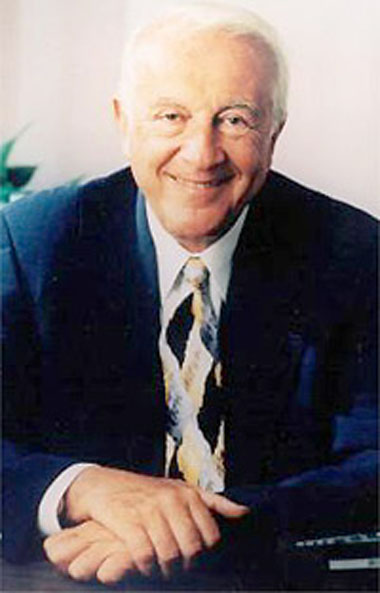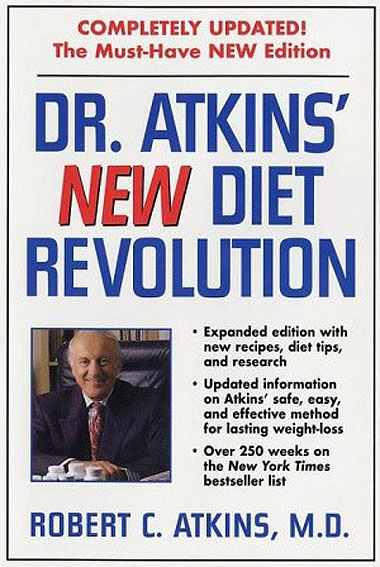現在位置 : 保健 > 阿金博士減肥法 - Dr. Atkins' Diet
|
阿金博士減肥法
羅伯特·阿特金斯 (Robert Atkins,1930年10月17日-2003年4月17日)是美國心臟病醫生和營養學家,以發明食肉減肥法而著稱。 阿特金斯出生並成長於美國俄亥俄州,1951年畢業於密西根大學,1955年自康乃爾大學醫學院獲得醫學博士學位,後來移居到紐約。40年前他也曾經是一個胖子,喜愛各種美食,因而在他只有30多歲的時候就開始發福,重疊的雙下巴和高高突起的大肚皮,讓他感覺到了威脅。在接受《傳記》雜誌的採訪時,阿特金斯說,1963年他在為身份證照相的時候,被自己肥胖的模樣嚇呆了。阿特金斯開始嘗試減肥。 起初,他也像人們通常所做的那樣,少吃高脂肪和高蛋白質的食物,盡量減少卡路里的攝入量。不過他很快就發現,這樣做雖說有效,但卻沒有人能長久地堅持下去。 他開始從大量醫學文獻中尋找出路。一個偶然的機會,他看到了一篇文章,這篇文章影響了他後半生的生活。那篇文章的作者是巴黎的醫生克勞德·貝爾納。他提倡人類應該完全放棄碳水化合物,而改吃高蛋白食品,因為碳水化合物可以被身體轉化成脂肪存貯起來,但蛋白質卻不會。 阿特金斯在不斷摸索中為自己制定了一個全新的減肥食譜。這個食譜中不僅沒有麵包、水果和蔬菜,甚至不包括所有含糖份的食物。按照食譜,他卻可以隨心所欲地大吃任何含高脂肪和高蛋白質的東西,例如那些煎得焦嫩滴油的小牛排,那些香味撲鼻的熏肉,還有那些新鮮可口的炸魚。這個食譜他非常樂於接受。 令人驚奇的是,沒過多久,他居然成功地減肥,又恢復了正常體重,最關鍵的是這種全新的減肥方式沒有讓他感覺到任何痛苦。 為了推廣這種減肥方法,1972年,他出版了他醫生生涯中的第一本醫學專著《阿特金斯醫生的新飲食革命》,這本書後來風靡了全美國。 上世紀90年代,肥胖在美國乃至全世界成為普遍現象,減肥也因此成為普遍的熱門話題。1992年他把第一本書修改後再版,竟一口氣賣出了1500萬冊,成為上世紀90年代最暢銷的書。由於有一個精通廚藝的妻子,阿特金斯如虎添翼,在妻子維羅妮卡的大力協助下,他又推出了他的新書《阿特金斯醫生的快速簡單新飲食食譜》,這使得他的吃肉減肥法更加容易操作。他名聲鵲起,不僅成了新減肥法的領軍人物,甚至成了新生活方式的代言人。他掀起了一場巨大的顛覆傳統的運動。人們拋棄了傳統食品麵包,轉而開始熱衷於所有高脂肪食物。 2002年他開始網羅專業人才調研市場,開發各種各樣以他的名字命名的減肥食品,並以極快的速度把這些減肥食品投放市場。同年,他的「阿特金斯營養品」公司營業額迅猛增長,從近乎於零點開始起步,翻著跟頭地往上升,最後高達1億多美元。公司從最初只買一些普通的維生素,到全面推出各種低碳水化合物食品,從冰淇淋到不含麵粉的切片麵包、甜餅、小蛋糕甚至巧克力,幾乎每個月都有幾個新產品推向市場。 在他生命的最後一年,阿特金斯名利雙收。他不僅推銷了他的減肥理念,也推銷了他的減肥產品,而後者讓他躋身億萬富翁的行列。阿特金斯登上一生最輝煌的頂峰。 然而他還想要更多更多。他夢想能把阿特金斯食品推廣到全球的每一個超市,夢想阿特金斯食品能出現在學校餐廳、療養院、餐館和健身俱樂部。他甚至說:「我希望能最終消滅肥胖症和糖尿病,我相信,上帝也希望我做到這一點。」 2003年4月8日,阿特金斯醫生在上班途中在冰面上滑倒,頭部撞向地面並且腦出血,在送往醫院的途中昏迷。9天之後,阿特金斯去世,時年72歲。 |
|
真相
阿特金斯從1972年他出版了自己的第一本書《阿特金斯醫生的新節食革命》之後,多年來他一直實行書中的方法,並成功得減去多餘的體重。隨著這本書在美國的風靡,他也多次出現在電視上,並且留下很多照片,人人都看得出來他那段時間是很健康的,而且保持著適宜的體重。 2000年,他患上了原發性心肌症,是一種無法醫治的心臟疾病。這種病可能會有很多原因,阿特金斯被診斷是源於一種病毒性疾病,醫生說明並沒有證據證明這種疾病是飲食導致,而且他的冠狀動脈報告顯示是暢通無阻的。這種疾病患者比較容易發生心搏驟停,而這種心搏驟停跟飲食並不相關聯。他的醫生指明,除了原發性心肌症,阿特金斯的心血管系統是極其健康的。 關於阿特金斯的體重,作家威廉.利斯(Leith, William)在阿特金斯患心臟驟停期間採訪他後寫道:「他看上去六尺不到,大約200磅左右,不瘦,但也絕對不胖。」阿特金斯營養公司的報告稱阿特金斯是個網球高手,而且經常稱體重,一直以來都保持在195磅以下,身高約1.8m。後來他的妻子公開的醫學報告中也表明,阿特金斯在進醫院之前體重是195磅。 2003年4月8日,阿特金斯在未融化的薄冰上摔倒,頭部撞向冰面,並導致腦部出血。在去醫院的路上他已經失去知覺。之後他的身體迅速惡化,遭受了大面積的器官損害。在醫院的兩周期間,他的身體明顯積聚了大量的液體,也就是這聚集的液體讓他的體重由之前的195磅變成了258磅。他的死亡證明書闡述的死亡原因是「頭部撞傷導致的硬膜外血腫」,並不是傳聞所說的因為心臟病發作。 美國內不拉斯加州的弗萊明醫生一直以阿特金斯的反對者出名,他一直與美國醫師醫藥責任委員會相聯繫。他索要了阿特金斯的病歷,導致了謠言的傳播,而這個病歷是不應該被公開的。他找到了一份手寫版的阿特金斯醫學檢查報告,寫道阿特金斯有心肌梗死、充血性心力衰竭和高血壓的病史。這份檢查報告引起以上委員會的過度重視,從而導致流傳到現在的謠言「他死於自己的食譜」。 阿特金斯去世後,他的妻子發表聲明抓捕散布他丈夫謠言的「無恥之徒」。顯然,那些「無恥之徒」已經取得了一定程度的成功。 2007年3月《新聞周刊》雜誌發表訂正聲明「早期關於羅伯特.阿特金斯的死亡原因的陳述包含與事實不符的內容,新聞周刊為次錯誤表示道歉。」 |
|
減掉脂肪,才是關鍵
阿金博士減肥法,成功案例超過2千萬人 摘自《減掉脂肪,才是關鍵》蕭敦仁 醫師著 原水文化出版 2010/08/17 飲食減肥法/阿金博士減肥法 心臟病學家羅伯阿金(Robert C. Arkins, M.D.),在美國被稱為「低糖飲食之父」,他在所著的暢銷書《阿金博士的減肥大革命》(Dr. Atkins' New Diet Revolution)中宣稱,已經幫助超過2000萬人成功減肥。他的減肥法跟其他減肥法不一樣的地方,就是只要不吃碳水化合物類食物,其他各種大魚大肉可以想吃就吃。 體重過重的人,多半是因為吃進過多的碳水化合物(包括各種糖類、五榖根莖類及其加工製品、還有水果等),讓血糖上升,胰臟釋出過多的胰島素所致,因此,阿金博士減肥法指出,當每日碳水化合物攝食量低於100克時,身體會燃燒蛋白質和脂肪,產生燃燒不完全的中間產物 -- 酮體,大量產生的酮體不但無法被身體吸收利用,且當其排出體外時需要帶走大量的水分與離子,以藉此達到快速減重的效果。 阿金博士這種「吃肉減肥法」,也可稱為「低胰島素減肥法」。曾有學術團體使用吃肉減肥法,對肥胖者進行為期六個月的研究,結果發現體重平均可下降12公斤,短期減重成效確實比傳統「限制熱量、低脂」的飲食減肥法好,但對長期的減肥效果與副作用的評估,則付之闕如。 採用此法減肥,因以肉為主食不容易產生飢餓感,還能滿足口腹之慾,讓肥胖者在較短的時間內減去體重,對於減肥者來說似乎很方便,但這個方法容易讓人吃肉吃到很膩,會想放棄減肥,約吃3至5天後,減重者就會覺得頭暈、精神不佳、燥熱、尿液酸臭等酮酸中毒現象。而英國科學研究還得到一項結論,使用吃肉減肥法減重,可能帶來另一個副作用就是情緒低落。 而根據美國農業部(USDA)的研究結果,也指出讓身體處於酮態的狀態,會造成身體脫水的情況,也就是說使用「阿金博士減肥法」所減輕的體重,其實不是身上的「脂肪」,而是身體的「水分」;換言之,只要減肥療程結束,身體不再脫水,就會很快復胖。 阿金博士減肥法/風行全球的高蛋白減肥法,短期使用「減重」效果顯著,但那是因為身體脫水所引起,停用後復胖率很高;肝腎功能不佳者不適用此種方法。 |
|
Dr. Robert Atkins
Robert Coleman Atkins (October 17, 1930- April 17, 2003) was an American physician and cardiologist, best known for the "Atkins Nutritional Approach", or "Atkins Diet", a popular but controversial way of eating that requires close control of carbohydrate consumption, emphasizing protein and fat as the primary sources of dietary calories in addition to a controlled number of carbohydrates from vegetables. Although the success of Atkins' diet plan, weightloss books, and lifestyle company, Atkins Nutritionals, led Time to name the doctor one of the ten most influential people in 2002, his critics in the medical and fitness communities continue to criticize Atkins' approach to weight loss. Diet During the early years of his medical practice, stress and poor eating habits led Atkins to gain a considerable amount of weight. In 1963, at a weight of 224 pounds (100 kg), he decided to go on a restrictive diet based on the research of Dr. Alfred W. Pennington, who recommended removing all starch and sugar from meals. The article exploring the study of Pennington's work, titled "A New Concept in the Treatment of Obesity", was published in the October 1963 issue of the Journal of the American Medical Association by Edgar S. Gordon, Marshall Goldberg, and Grace J. Chosy, and advocated for the complete elimination of sugar from the diet and a marked increase in both fat and protein. Atkins found immediate and lasting success on the plan, and began advertising its effects to his patients. While working as a medical consultant for AT&T, he even managed to help 65 patients there reach their ideal weight with his low-carbohydrate, ketogenic diet program. In 1965, Atkins appeared on The Tonight Show to promote his weight loss plan and the diet he recommended was subsequently published in Vogue in 1970. The popularity of the plan with the magazine's female readership caused a surge in popularity for both Atkins and the magazine, and his dietary regimen was known for many years as simply "The Vogue Diet". Atkins finally published his meal plans along with his own findings based on patient research in the book Dr. Atkins' Diet Revolution in 1972. The book became an instant bestseller selling in millions of copies and led Atkins to release a series of cookbooks, health guides, and diet products in the coming decades. The success of Atkins' commercial diet products also allowed the doctor to open the "Atkins Center for Complementary Medicine" in Manhattan, a holistic medicine center advocating alternative medicine practices. By the early 1990s, the center employed 87 people, and reported treating more than 50,000 patients. In 1998, Atkins also founded the nutrition and supplements company Atkins Nutritionals to promote his high-fat, low-carbohydrate diet, and the brand grew to include not only diet-controlled carbohydrate, low-glycemic food products, but also a variety of lifestyle items that generated a revenue of over $100 million. By this time, Atkins had revised his approach to allow for more flexibility and variety in the weight loss plan and had published Dr. Atkins' New Diet Revolution in 1992, which again became a bestseller selling more than 15 million copies nationwide. Controversy In his dieting approach, Atkins suggests that the "carbohydrate is the bad guy", and through extensive research, he claimed that it caused the body to overproduce the hormone insulin, a condition called hyperinsulinism, which metabolizes blood glucose and thus makes people feel hungry. Many doctors and nutritionists decry this explanation as an oversimplification of the metabolic processes, however, and argue that Atkins' claims that human beings did not evolve to properly digest carbohydrate are unsubstantiated, particularly because, they claim, the human diet has relied on carbohydrates to supply energy for thousands of years, with meat and dairy consumption being only sporadic. Further, they discredit Atkins' notion of "hyperinsulinism", claiming that the state he describes is better known as type 2 diabetes, a disease that is brought about by obesity and not being the root cause of it. Critics also pointed out the potential for long-term health problems associated with a diet low in fiber due to the program's restrictions on fruits and vegetables in the early weight loss stages. A balanced diet, they argued, should not require a person to supplement its meals with vitamins and other supplements. Atkins admitted that he could not fully explain the remarkable weight loss achieved by those who followed his eating plan, and he never published his conclusions in a peer-reviewed medical journal. Other nutritionists studying the effects of low-carb dieting overall suggest that the extreme weight loss might be unrelated to the restriction of carbohydrate and is instead related to the natural calorie restriction that comes with the feeling of increased satiety in a high-fat diet. Despite the obvious criticism however, Atkins' work inspired a whole new tendency in dietetics with many other companies releasing low-carb diets and low-carb foods as well. |
|
Doctor denounces Atkins diet as life threatening
By Catholic Online 9/10/2010 Medico says diet based on animal protein unhealthful The Atkins diet, which briefly enjoyed popularity at the turn of the century, was essentially a diet that let people eat the burger and not the bun. It was a diet that allowed people to eat as much animal protein as they desired, but no breads and carbohydrates. Dr. Dean Ornish, M.D., Founder and President of Preventive Medicine Research Institute and Clinical Professor of Medicine at the University of California, San Francisco has made it clear that the Atkins diet is unhealthful - if not life threatening. LOS ANGELES, CA (Catholic Online) - "A major study was just published in the Annals of Internal Medicine from Harvard," Dr. Ornish writes in the Huffington Post. "In approximately 85,000 women who were followed for 26 years and 45,000 men who were followed for 20 years, researchers found that all-cause mortality rates were increased in both men and women who were eating a low-carbohydrate Atkins diet based on animal protein," Ornish says. Ornish believes that a diet based on plant-based protein is the only way to go. "However, all-cause mortality rates as well as cardiovascular mortality rates were decreased in those eating a plant-based diet low in animal protein and low in refined carbohydrates. Although this plant-based diet was called an 'Eco-Atkins' diet, it's essentially the same diet that I have been recommending and studying for more than 30 years." The founder of the Atkins diet, Dr. Robert Atkins, engaged in many conversations with Ornish before he died in a freak accident in 2003 at the age of 72. "In many debates with Dr. Atkins before he died, I always made the point that it's important to look at actual measures of disease, including mortality, not just risk factors such as HDL cholesterol. This is the first study that examined mortality rates in those consuming an Atkins diet, and it confirms what I've been saying all along: an Atkins diet is not healthful and may shorten your lifespan." There was common ground on which both doctors agreed. "Dr. Atkins and I agreed that the American diet is too high in refined carbohydrates such as sugar, white flour and concentrated sweeteners) which promote a variety of chronic diseases. That's why people often lose weight on an Atkins diet when they restrict their intake of refined carbohydrates. "However, the answer is not to replace refined carbohydrates with animal protein such as beef, pork rinds, bacon and sausage, which Dr. Atkins claimed were good for your heart. I'd like to be able to say that they're good for your heart, but they are not. It's much more healthful to replace refined carbohydrates ("bad carbs") with healthy carbs instead," Ornish writes. |
|
Bittersweet Vindication for Atkins Diet
The Pennsylvania Gazette, 7/1/2003 —Ted Mann C’00 After decades of ridicule by the American medical establishment, it’s fittingly ironic that Dr. Robert Atkins had his epitaph published in the New England Journal of Medicine. Atkins, who died on April 17 at age 72, spent most of his life advocating a diet low in carbohydrates and high in fat and protein. The May 22 issue of the journal contained two studies that examined the effects of such low-carbohydrate diets. Both studies were led by Penn faculty and both offered a qualified vindication of the Atkins approach, concluding that it is an effective weight-loss regimen and—to the authors’ surprise—a safe way to reduce cardiac-risk factors. One study was led by Dr. Gary Foster, an associate professor and the clinical director of Penn’s Weight and Eating Disorders Program, a multi-center operation that put the Atkins plan head-to-head with the Department of Agriculture’s Food Pyramid guidelines. Having received independent funding from the National Institutes of Health (NIH), the year-long study isn’t vulnerable to the criticisms leveled at some previous research, particularly studies that were paid for and initiated by the Atkins Center. At the three- and six-month marks, Foster’s team found that the participants lost significantly more weight on the Atkins diet (at six months, 15.4 pounds on Atkins versus 4.2 pounds on the low-fat diet). Even more important, the Atkins dieters registered greater increases in “good” cholesterol (HDL) and greater decreases in triglycerides (fats in the blood) than those following the conventional diet. Foster’s findings were echoed by another study, led by Dr. Frederick Samaha, assistant professor of medicine at Penn and head of the cardiovascular division at the Philadelphia Veterans Affairs Medical Center. It examined a group of 132 severely obese men and women (average weight: 286 pounds) with a high prevalence of diabetes. After six months, the participants lost an average of 12.8 pounds on Atkins versus 4.2 on the low-fat, calorie-restricted diet, and showed a “relative improvement in insulin sensitivity and triglyceride levels.” (The authors also said the findings should be interpreted with “caution,” given the “small magnitude” of weight-loss differences and the relatively short duration of the study.) The only apparent drawback to the Atkins diet, as reported in the Foster-led study, is that after a year, the participants had regained about a third of their lost weight. While that still amounts to an average net loss of 9.7 pounds, or four pounds more than the low-fat dieters reported, it also suggests that the Atkins diet is difficult to adhere to for more than one year. For Foster, the decision to study the Atkins diet was difficult, primarily because of the stigma it carries in the medical community. “There are some negative connotations,” Foster says. “He [Atkins] has flown in the face of conventional wisdom for a long time, and hasn’t done it in a particularly scientific way … It’s sort of like abortion, it seems to me. People feel very strongly about it, on one end or the other. There’s lots more opinions than data.” This lack of empirical data, combined with the diet’s overwhelming popularity, was what ultimately convinced Foster of the need for a long-term study. “I consider it a public-health issue. If 10 million copies of this book have been sold and people are doing the diet, we ought to know something about it in the scientific community,” he says, referring to the perennial bestseller Dr. Atkins New Diet Revolution, which has actually sold 15 million copies since 1972. “From my vantage point, we’re not doing well in the long-term treatment of obesity, so we need to take alternatives seriously. Not every quack thing that comes down the pike, but for obvious reasons Atkins is a longstanding, popular diet.” Unlike many previously published reports on low-carb dieting, Foster’s study was the first to follow the strict Atkins regimen verbatim. At the outset, participants met with a dietician and were given either the Atkins-authored book or a manual on the Food Pyramid—the standard low-calorie, high-carb diet (the guidelines for which may soon be revised by the federal government). After this initial meeting, however, the dieters were left to their own devices. This self-help model was intended to mimic the way most people attempt to lose weight, but, of course, it also mimicked the high attrition rate that’s so common with dieting in general. By the end of the 12-month study, 39 percent of the Atkins dieters had dropped out. On the flip-side, the conventional diet had a 43 percent dropout rate. So, while neither diet was easy to stick to, the lack of bread, rice, and sweets in the Atkins approach didn’t make it any more difficult to follow. One interesting—and under-reported—finding in Foster’s study is that subjects following the Atkins diet lost weight regardless of whether or not their body was in a state of ketosis (having excess ketones, a byproduct of fat metabolism). That debunks a long-held belief by the Atkins camp that its diet functions on an alternate metabolic system, whereby the human body burns fat stores, generating ketones when it is deprived of carbohydrates. Although Foster found that some subjects did indeed produce ketones, it wasn’t an appreciable amount and it wasn’t predictive of weight-loss. So, if ketosis is a scientific red herring, what then explains the Atkins diet’s effectiveness? “From a scientific point of view, there’s no way to explain great weight loss besides eating fewer calories or exercising more,” says Foster. In other words, despite unrestricted amounts of butter, mayonnaise, and T-bone steaks, the subjects following Atkins consumed fewer calories than the low-fat dieters. To skeptics who suggest that the diet is thus of little consequence, he responds: “We’ve got an epidemic of obesity and we’ve got to find ways that are more palatable for people to lose weight. If low-carb diets help you do that—if they make you less hungry, if they make you more full, and it’s more tasty—then we have to look at that.” To that end, Foster and his colleagues have secured additional grant money from the NIH to continue studying the long-term effects of low-carbohydrate dieting. They are currently enrolling participants for a five-year study, in which they plan to measure such things as kidney function, endothelial function (the elasticity of arteries), and people’s ability to exercise. Ultimately, Foster hopes that his follow-up research will explain why the Atkins diet works for some sub-groups, but not for others. “It may be that people who have high insulin-resistance do better on a low-carb diet, but people who have okay insulin-resistance do better on a high-carb diet,” he says. “Those kinds of sub-types are exactly the questions we need to be asking in the field. Not why it works or doesn’t work, but for whom and under what conditions.” —Ted Mann C’00 -------------------------------------------------------------------------------- © 2003 The Pennsylvania Gazette Last modified 04/28/03 |
|
Larry King Dr Robert Atkins Part 1
|
Larry King Dr Robert Atkins Part 2
|
|
Larry King Dr Robert Atkins Part 3
|
Larry King Dr Robert Atkins Part 4
|




